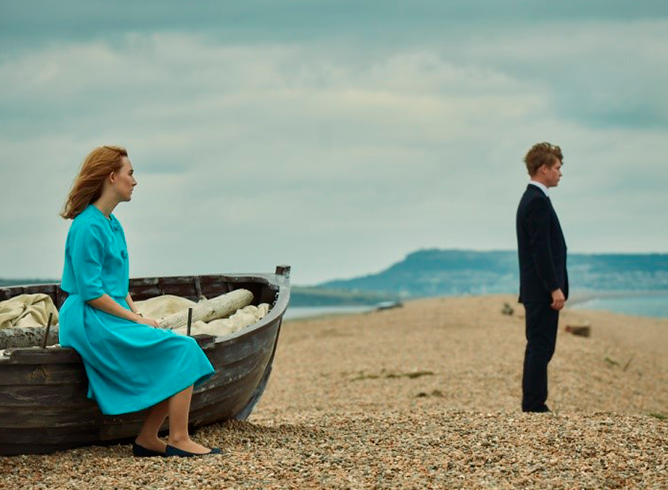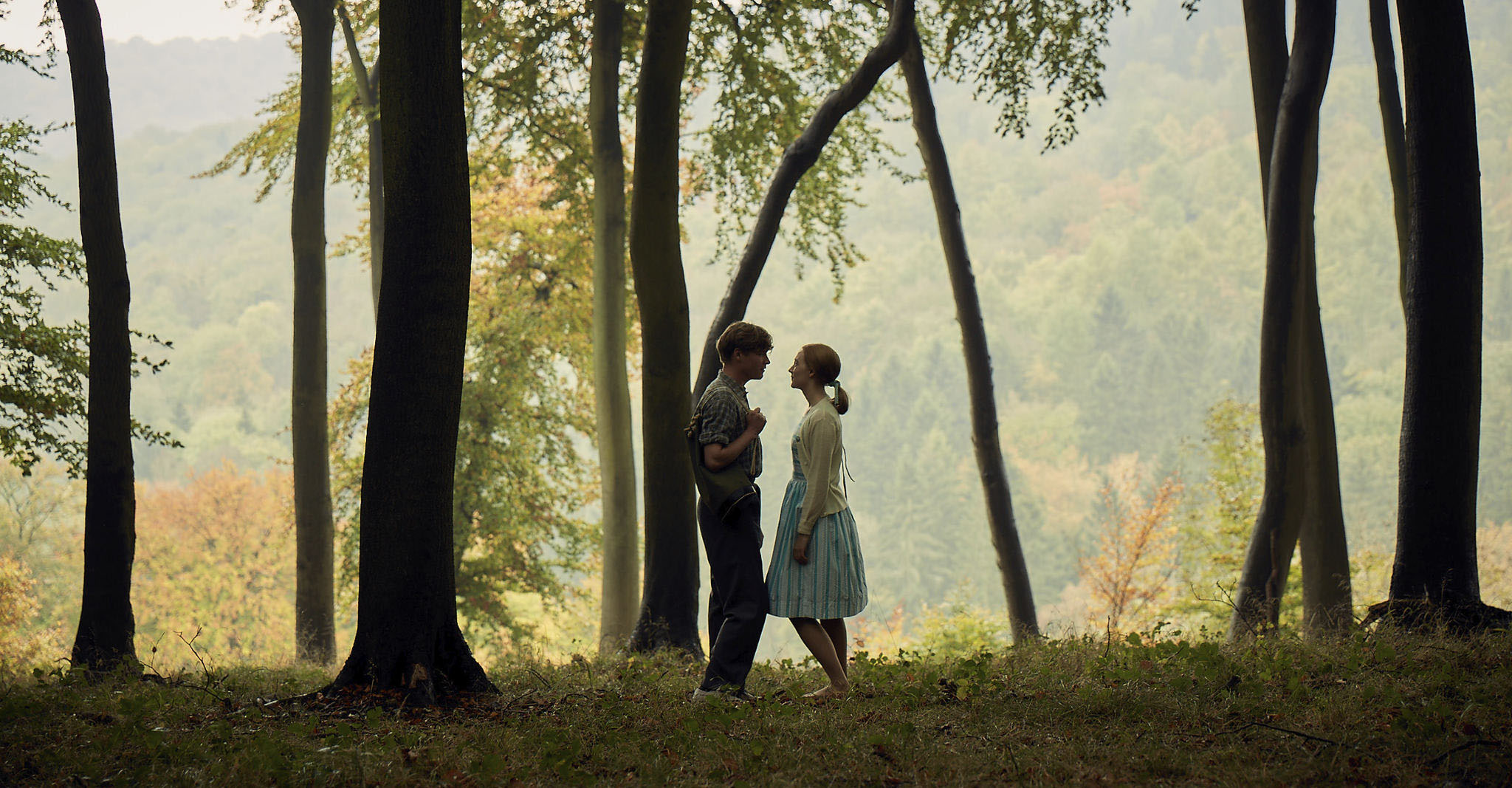- Home |
- Search Results |
- Ian McEwan and Billy Howle discuss the new adaptation of On Chesil Beach

When considering adaptations, it is always interesting to know how much the original novel influences an actor’s performance. For Howle, “sometimes it helped and sometimes it was a hindrance because the blueprint was no longer the novel. It was a really good resource, but that’s all it becomes, eventually. Your manual is the script – that’s your bible, that’s gospel, and so there was a point where we all said, ‘we’ve got to leave the novel alone now.’”
Howle’s interpretation of Edward is a little more stilted and faltering than the character appears in the novel, but he utterly encapsulates the awkwardness of a virgin on his wedding night. Naked except for a shirt and socks (the tie is at least removed, although almost as an afterthought), he thrusts himself eagerly upon his new wife. We all die a little inside at realising his ineptitude.
Having previously starred in the film version of Julian Barnes’ accomplished novel The Sense of An Ending, Howle is well placed to discuss book-to-screen adaptations. “The detail in Julian Barnes’ and Ian’s work lends itself to the screen because they write locations and geography as characters. That’s fascinating for anyone to adapt, be it the author themselves or not, because how do you translate that onto the screen? That’s a real challenge for the director, actor and anyone else involved.”
Indeed, you could almost argue that the beach it is the story’s eponymous antihero. The row on the pebbles is the crux of the novel, the sea air thick with misunderstanding and resentment. You would be hard-pressed to find a more appropriate, desolate surrounding for the misery unfolding between the newlyweds.

The wind was so strong! But that scene, the emotional rise and fall of it, was more or less as I’d hoped.
McEwan specifies this climactic scene as the most gratifyingly similar to the film playing in his head. “We knew we’d be at the mercy of the elements, and it was not as I pictured –because I imagined it sunny; this was windy and cold. The rushes are packed with a lady holding a blanket to wrap Saoirse up in between takes, and the blanket was parallel to the ground, the wind was so strong! But that scene, the emotional rise and fall of it, was more or less as I’d hoped. Like many rows between people who love each other, there are moments when it’s stormy, followed by moments of near reconciliation, and then it all blows up again in another direction. I’m glad we gave it so many hours in rehearsal.”
At the age of 24, and with three Oscar nominations to her name, it is astonishing that the role of Florence is really only Ronan’s second ‘adult’ lead (playing a young, Irish immigrant in Brooklyn was her first). It was her turn as the duplicitous Briony in another of McEwan’s film adaptations, Atonement, which initially catapulted her into the spotlight, and her performance in On Chesil Beach is no less striking.
One of the risks of adapting a novel with such a dense, descriptive narrative is that it can mean losing a lot of the subtlety of inner monologues like the ones in On Chesil Beach but, with Ronan at the heart of the film, McEwan believes that even some of his own dialogue was found wanting. “It was part of the process of rehearsal to remove unnecessary lines because she could play them out for us. So, in a sense, she’s a gift to a writer; she can do what cinema finds hard to do, which is to transmit the nature of consciousness, the actual flow of inner life”.
That inner life is what makes Florence such an engaging character. At only 22, her confidence is captivating; she is an atypical ingenue. In the book, when she first encounters Edward at a local CND meeting, he observes that she holds his gaze – unlike most girls he stares at.

But while Florence is unflinching when she has something in her sights, her naivety is almost crippling when it comes to anything remotely sexual. Quotes from a sex manual plague her thoughts, sounding more like lines from a Bernard Manning routine than attempts to offer genuine or helpful advice (“Women are like doorways; men can enter through them”).
The brittle reserve of Ronan’s performance effectively translates the extreme discomfort that readers of the novel hear more directly in Florence’s inner monologues. Surely that success must be due, in part to the authenticity of having the author behind the screenplay?

Writing a novel is to address yourself to a finished literary form. The screenplay is not a finished form, it’s part of the recipe
McEwan considers the difference between being a novelist and a screenplay writer. “Well, it’s a sort of demotion from God to a little cherub, or General to Corporal. You become part of the process. Writing a novel is to address yourself to a finished literary form. The screenplay is not a finished form, it’s part of the recipe, it’s not the meal. It’s very, very different.”
Does he write directions for the actors? “I try to avoid too many adverbial instructions to actors. I take some instruction in this from Harold Pinter, who I think is a superb screenplay writer. And his screenplays are noticeably empty of any instruction at all, which sets directors free. But I had to give some. I don’t like burdening actors with adverbs about how they should behave, but there are certain moments when you really want to bring the director’s attention to what is the key visual stroke.”
Losing the autonomy of writing a novel by becoming a cog in a much bigger machine must be in parts galling and oddly freeing. This is director Dominic Cooke’s debut feature film - up until now he has predominantly worked in theatre. McEwan sees this as a bonus. “Because his roots are in the theatre, he’s very used to collaborating closely with writers. Part of the pleasure of screenplay-writing is breaking out of the loneliness of sitting hour after hour in one place writing a novel; to be collaborating.”
The film’s conclusion regarding the fate of Florence and Edward diverges slightly from the novel’s ending. This might have outraged readers, had it been penned by anyone but McEwan himself. “It was my idea, really. I felt we had to get away from what I had in the novel. We hear about the fates of the characters, but that’s simply in the narration – no other character in the book knows what happens. Cinematically, I felt it was compelling that Florence and Edward must have a sort of meeting.”
This is a film not wholly dependent on plot, but on atmosphere. A feeling of loss and frustration stays with us long after the credits roll. There is often a chill in the air, even in the happier flashbacks, with recurring, cool, blue hues foreshadowing the iciness of the argument on the beach. It seems surprising that McEwan intended those scenes to be set under a baking summer sun. Perhaps the unforgiving stormy weather was too heavy-handed a metaphor for a writer who takes such delight in upending the natural order of things.
Watch the full interview here